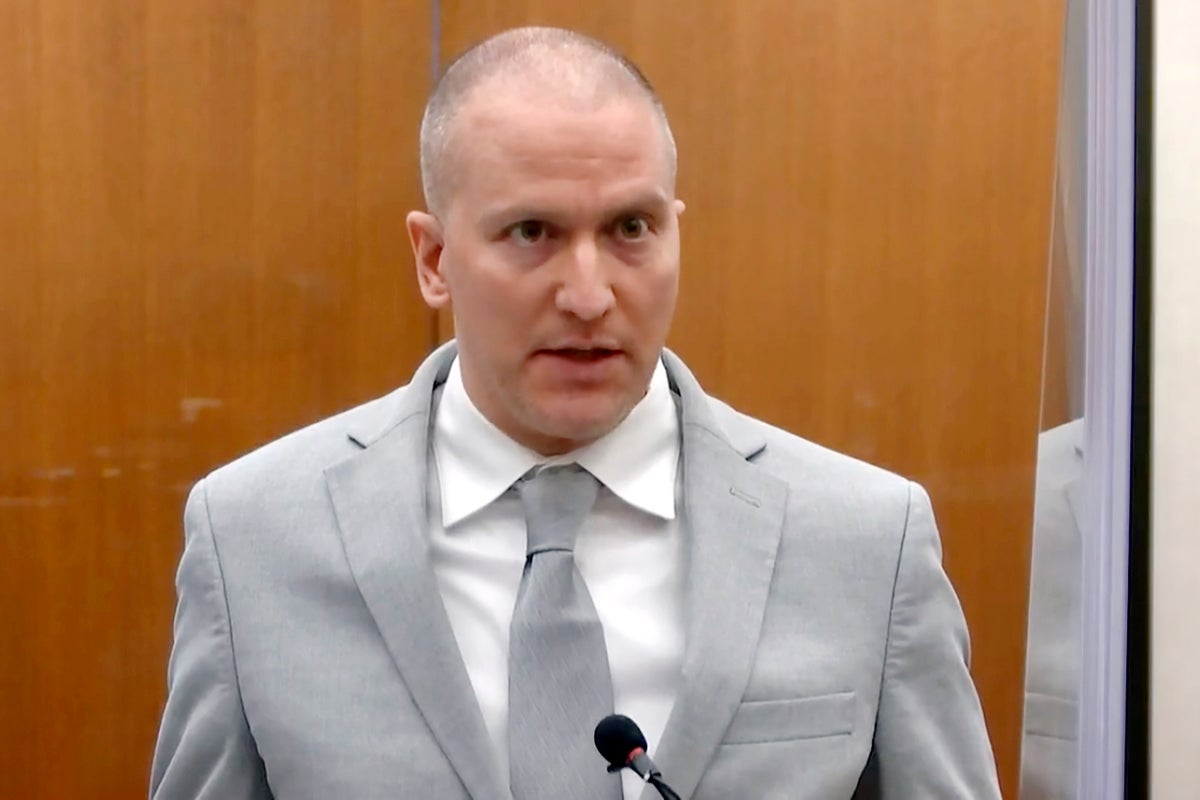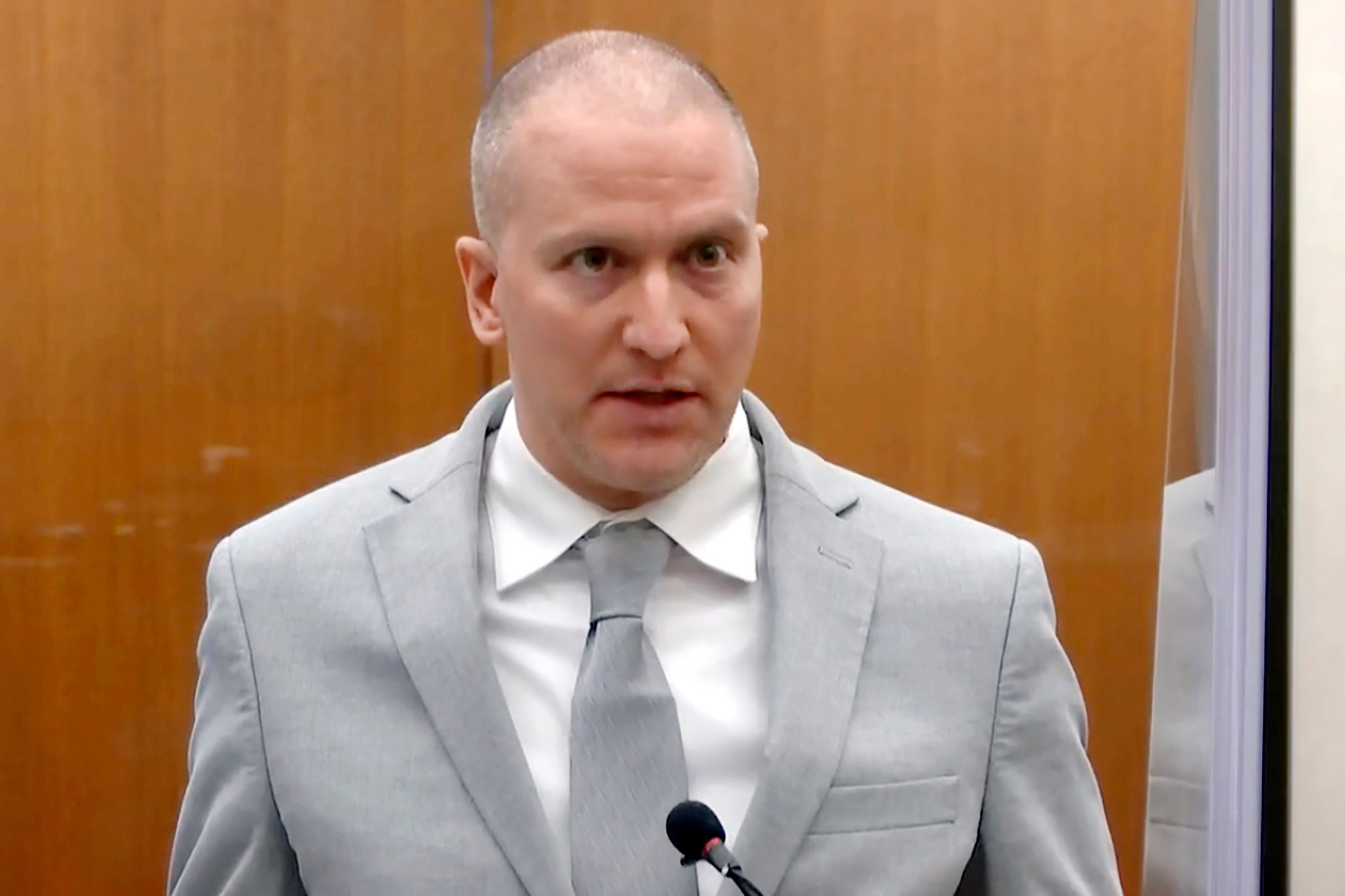
Convicted murderer and disgraced former Minneapolis police officer Derek Chauvin is now about to swap solitary confinement and fears of run-ins with cons he helped put away in state prison for a comfier, safer stay at a federal facility.
On Thursday, Chauvin was sentenced to 21 years in federal prison for violating George Floyd’s civil rights when he knelt on the Black man’s neck for nine minutes and 29 seconds as he begged for air saying “I can’t breathe” until he died.
In handing down the sentence, Judge Paul Magnuson condemned the white former officer’s actions saying: “To put your knee on a person’s neck until they expired is simply wrong… Your conduct is wrong and it is offensive.”
Chauvin also spoke at his sentencing to address the children of the man he killed.
He told Floyd’s children that he wishes them “all the best in their life” but stopped short of apologising for leaving them to grow up without their father.
“I just want to say that I wish them all the best in their life and have excellent guidance in becoming great adults,” he said.
The federal sentence comes more than one year after Chauvin was convicted of second-degree murder, third-degree murder and second-degree manslaughter at his state trial in April 2021.
He was sentenced to 22-and-a-half years in state prison on those charges and has been behind bars at Minnesota’s maximum security prison at Oak Park Heights.
Where will he go now?
Following his conviction and sentencing on state murder charges last year, Chauvin had been awaiting trial on federal civil rights charges alongside fellow former officers Tou Thao, Thomas Lane and J Alexander Kueng.
Chauvin was charged with violating the civil rights of Floyd during his Memorial Day 2020 murder and also with violating the civil rights of a Black teenager in a separate incident back in 2017.
In December, Chauvin reached a plea deal with federal prosecutors to avoid going to trial.
Under the terms of the deal, he pleaded guilty to the civil rights charges in exchange for being moved to federal prison for the remainder of his sentence on both state and federal charges.
At present he is currently being held at the Minnesota Correctional Facility at Oak Park Heights.
The Bureau of Prisons is responsible for placing inmates in prisons and could send Chauvin to any federal facility across the country.

It has not yet been revealed where Chauvin is being sent to serve his time.
Factors typically considered are whether the inmate needs to be placed in a low, medium or high security facility, length of sentence and special requirements such as healthcare of the inmate.
At his sentencing, Chauvin’s attorney said that he had been “preliminarily diagnosed with heart damage”.
Why is federal prison better?
Federal prisons are notoriously comfier and safer than state prisons, with fewer violent and dangerous inmates and less overcrowding.
At Oak Park Heights, Chauvin has been held in solitary confinement in a 10 foot by 10 foot cell for 23 hours a day for his own safety due to the high-profile nature of the killing.
He is only allowed out of his cell for one hour a day for exercise and does not mix with the general population.
Chauvin’s former occupation as a law enforcement officer also put him at increased risk, as there was a greater chance of him running into inmates who he arrested or helped put away while behind bars in the state facility.
This risk of run-ins will likely be reduced at a federal facility.
If the Bureau of Prisons deems it safe to place Chauvin among the general prison population, he will live under fewer restrictions and be able to take part in work and education inside.

When will he be released?
The federal judge sentenced Chauvin to 21 years in prison on the federal charges, minus seven months for time he has already served since reaching the plea deal and awaiting sentencing.
Prosecutors had requested he receive 25 years while Chauvin’s legal team asked for 20 years.
The federal sentence is to be served concurrently alongside his state sentence of 22-and-a-half years.
State and federal prison systems have different rules around when inmates are eligible for parole meaning that, even though the federal sentence is shorter, Chauvin will spend longer behind bars before his first chance of release.
On his state charges, Chauvin would be eligible for parole after serving 15 years while on the federal chargers he must serve almost 18 years before he will be eligible for parole.
This means that Chauvin, now 46, will not be eligible for release until 2039 at the earliest. He will be 64 years old.







